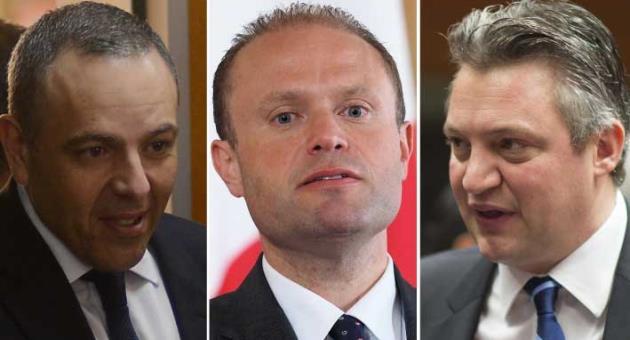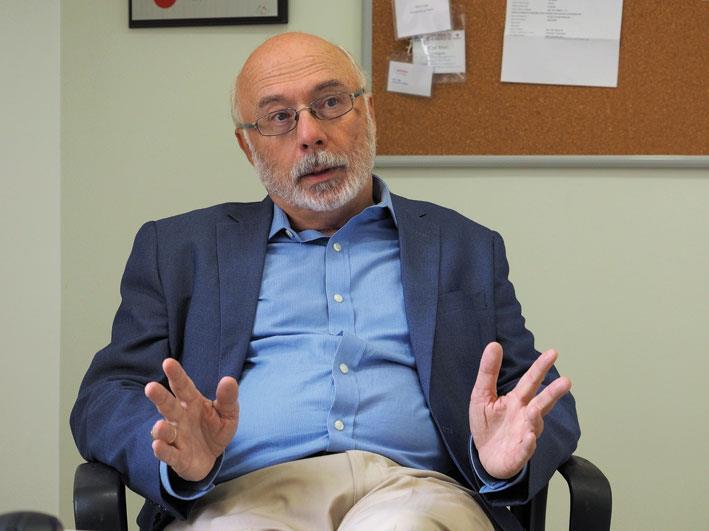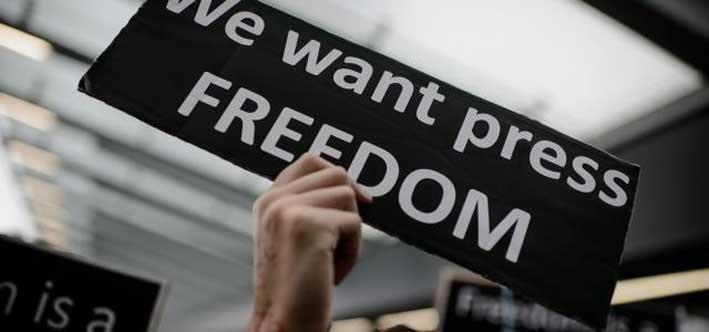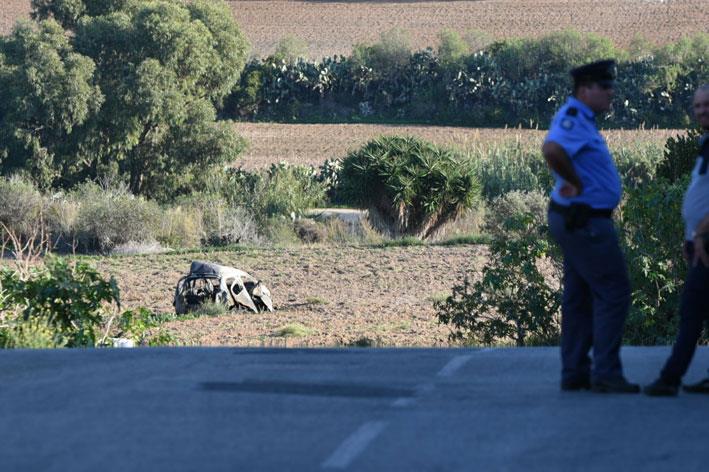Veteran journalist and journalism lecturer Marc Edge said that in most advanced democratic countries, people under investigation or suspicion of having committed grave deeds resign their post until their name is cleared or otherwise. Hesitation to resign would be unheard of, he said.
The Malta Independent sat down for an interview with Edge, a Canadian associate professor of media and communications in the faculty of media and knowledge sciences at the University of Malta.
Over the past months, there have been several calls for people holding important positions within the government, particularly following the revelations made by the Panama Papers. Minister Konrad Mizzi and OPM chief of staff Keith Schembri have held on to their posts in spite of allegations made against them, while Prime Minister Joseph Muscat has also retained his position although it was alleged that his wife was the owner of a company, Egrant, that was opened in Panama along with two others by Mizzi and Schembri. Magisterial inquiries are under way, with the Muscats denying the allegations.
Edge has a lengthy resume’, having worked and taught in several countries around the world. Of particular interest is his tenure at a university in Fiji which was at the time under a dictatorship. The authoritarian government severely restricted the press freedom in the country causing him a certain amount of trouble.

Edge believes that the motive behind Daphne Caruana Galizia’s murder is related to information control mostly to do with the government but also organised crime since her blog covered a wide range of subjects. As a result, he points out that the lack of resignation of members of government and their staff members is in stark contrast with what happened in Slovakia where another investigative journalist was killed and subsequent resignations from the government ensued. Resignation is “apparently something that does not happen in Malta,” he noted.
Edge is of the firm belief that with better journalism comes a better society. If journalism is constrained and is not allowed to bring facts to light then this fosters corruption, he asserts.
Referring to the Daphne Project, Professor Marc Edge believes that such investigations carried out by newspapers are badly needed. There have been comments made that the Daphne Project has somehow put a bad light on Malta and when confronted with this Edge says “they are looking for facts, they are looking for the truth, they are looking to bring the truth to light, how can that possibly be a bad thing?”
The Daphne Project is a group of 45 journalists representing 18 news organisations that have continued to work on Daphne Caruana Galizia’s stories.
He believes the Daphne Project might be a bad thing for those upon whom the facts might cast aspersions but the Maltese people should want to know what is really happening in Malta. Edge states that if the allegations of corruption are true then there needs to be a remedy to the problem which is central to the life of politics in any country.

Edge worked as a journalist as well as an academic with several newspapers and universities around the world. His first job was actually delivering the newspaper and that is how he got interested in journalism. He says he had this great romantic notion of seeing his name on the front page of a newspaper. Following his studies in commerce at university, he had several jobs as a journalist with special interest in business, news, and law. At one point he took a leave of absence to complete a Masters degree.
Newspapers were already downsizing in the early 1990s so he took a very early retirement at the age of 38 and travelled the South Pacific by boat. He then decided to go on to study for his PhD in Mass Communication which was awarded the Doctoral Dissertation Award of the American Journalism Historians Associations and subsequently published as a book. He has so far had more than 15 peer-reviewed academic journal articles and written five books. He will be completing his sixth book by the end of the year on the UK newspaper industry.
Following more teaching posts in Texas, British Columbia and Singapore he took on a post as head of journalism in Fiji. Edge explains how “Fiji was ruled by a dictatorship at the time and I ran foul of their media repression. I started a blog about media analysis and they did not appreciate my criticism of the government.” Mainstream media in Fiji is suppressed by the government under the media degree which is rather draconian says Edge, it provides fines and even jail sentences for what were once ethical violations. One particular blog entry by Edge hit the fan and the government insisted he take it down. The government even threatened to reduce funding to the university where he worked. Things went from bad to worse and whilst Edge was not technically forced to leave Fiji, he was given very little option.

Edge says he is now in Malta not only to teach journalism but also to improve journalism which he asserts requires press freedom. In doing so he tries to be as objective and non-partisan as he can he insists. Although he has lived in many places, Edge sees Malta as having a very high level of political partisanship, although he says it is present in other countries to a lesser extent. He speaks about Maltese peoples’ allegiance to one party and says it is like the party can do nothing wrong. “When it comes to the political life of the country these things are too important to let beliefs and opinions get in the way of facts. Facts are the most important thing and they are what the governments and politicians should be judged on not on partisanship,” he explains.
Edge believes that in Malta restriction of press freedom is politically motivated but is especially political bipartisan. He insists that both sides when they are in power, use what laws they can to keep a lid on the press carrying out investigations. He points out that that the one guiding principle of government is to have a certain level of censorship as without it they cannot have control.
Unfortunately for whoever ordered the assassination of Daphne Caruana Galizia they are now finding out that killing a journalist will not actually stop the facts from coming out, asserts Edge. In fact, her death has galvanised the journalistic community he continues.

Every country has its own unique history, culture and geography, things that help determine its level of press freedom he explains. “Malta has always had a fairly good reputation in relation to press freedom except of course recently with the assassination of Daphne Caruana Galizia. The killing has cast a definite cloud over press freedom and has caused Malta to fall18 spots in the latest rankings of Reporters Sans Frontier.” Edge points out. He also talks of the way she was treated when she was alive with some of the libel suits against her and the freezing of her bank account. He is of the belief that such laws should be changed if press freedom is to increase in Malta. “It does have a chilling effect on journalism when a journalist is assassinated. Even in all the time I was in Fiji, no journalists were ever killed, that is going beyond the pale. Unfortunately here in Malta, you have gone beyond the pale and this needs to be repaired somehow,” he said.
Edge maintains that it is incumbent for journalists and press freedom advocates to call for the removal of restraints on press freedom such as the libel laws. A call for freedom of information laws which require the government to provide information upon request by journalists, to provide some transparency and openness is also essential he continues. These philosophies are the hallmark of democracy Edge declares.
Following his analysis of the Prime Minister’s speech for BBC with John Sweeney Edge on the program Newsline that was aired on the radio station RTK, Edge received a number of negative comments. Edge analysed that whilst what Prime Minister Joseph Muscat said was well reasoned his body language told another story. Muscat appeared uncomfortable and he gave off the impression that he was not trustworthy Edge pointed out. He said the Prime Minister appeared nervous and the term “artful dodger of Europe” as he was referred to was quite apt. Most Maltese must have cringed as they watched the interview Edge suspects.
One of Edge’s books named “Greatly Exaggerated: The Myth of the Death of Newspapers” deals with the financials of North American newspapers and media conglomerates. He draws a surprising conclusion that the newspaper business is actually more profitable and more profitable than believed despite the notion that they were doomed to fail in the era of smartphones and social media.
In the past ten years, especially since the financial crash of 2008 there has been much speculation about the death of newspapers and it had been predicted that newspapers would not be around much longer, Edge explains. Through his business background Edge found out that most newspapers in North America are still making money although their revenues decreased sharply from 2006 to 2013. Following adaptations especially through online media publishing houses have been given a new life he says. Edge has now extended his studies to the UK and has come to note that the Times of London, which has historically been a loss leader for the Murdock Group has in the recent year become a money maker because of its hard pay wall. Edge believes that each newspaper is finding ways of surviving using different business models.